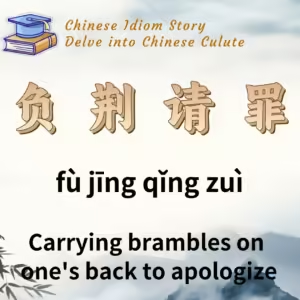
Chinese Idiom: 负荆请罪 (Fu Jing Qing Zui)
English Translation: Carrying brambles on one’s back to apologize
pīn yīn: fù jīng qǐng zuì
Idiom Meaning: This idiom refers to actively admitting one’s mistakes and apologizing to someone.
Historical Source: “Records of the Grand Historian” (《史记 ·廉颇蔺相如列传》)
Idiom Story:
In 283 BC, after Lin Xiangru successfully returned the precious jade to Zhao, he further distinguished himself at the meeting in Mianchi in 279 BC, where he cleverly confronted the King of Qin, defending the dignity of the Zhao state. Zhao Huaiwang, recognizing his contributions, promoted him to the position of a high minister, elevating him above the seasoned general Lian Po.
This promotion angered Lian Po, who had served as a general for many years and believed he had made significant contributions to the state. He expressed his frustration by saying, “I have fought valiantly for the state, while Lin Xiangru, a man of humble origins, has gained his position merely by eloquence. I feel ashamed to face others.” He vowed, “If I encounter Lin Xiangru, I will surely humiliate him.”
When Lin Xiangru learned of Lian Po’s remarks, he chose to avoid confrontation, often feigning illness to avoid attending court when Lian Po was present. One day, while traveling in a carriage, he unexpectedly ran into Lian Po and hastily turned away. Lin Xiangru’s companions, witnessing this, were outraged and felt that he was too submissive. They even contemplated leaving him.
However, Lin Xiangru firmly opposed this idea, explaining, “Consider the mighty power of the King of Qin; I dare not rebuke him in court. Even if I am lesser in talent, I do not fear General Lian Po. I think of the state’s safety first. If two fierce tigers fight, they both will inevitably suffer. My patience is for the sake of the country’s security, not merely personal grievances.”
Eventually, Lian Po heard of Lin Xiangru’s thoughts and felt deep remorse and shame. To demonstrate his sincerity in admitting his mistakes, he removed his upper garments, carried a bramble staff on his back, and was guided by guests to Lin Xiangru’s residence to apologize. Upon seeing Lin Xiangru, Lian Po sincerely remarked, “I am a lowly person, unaware that the general could be so magnanimous.”
From that moment on, the bond between Lin Xiangru and Lian Po deepened. They became loyal friends who worked closely together to serve their country effectively. This story serves as the origin of the idiom “负荆请罪,” symbolizing the virtue of acknowledging one’s errors and seeking reconciliation.






